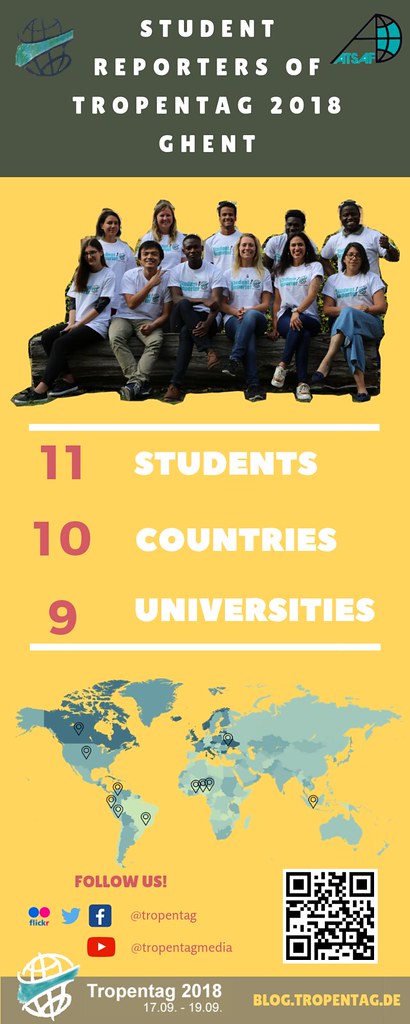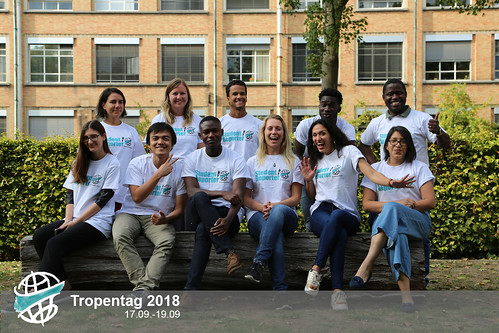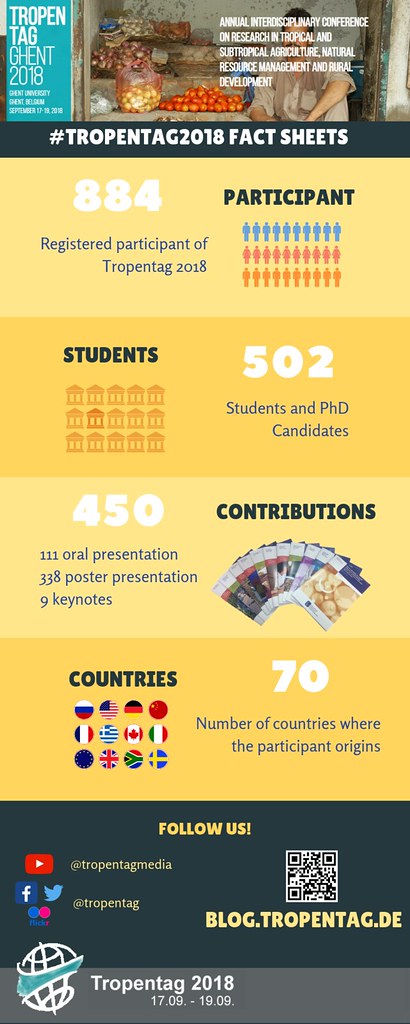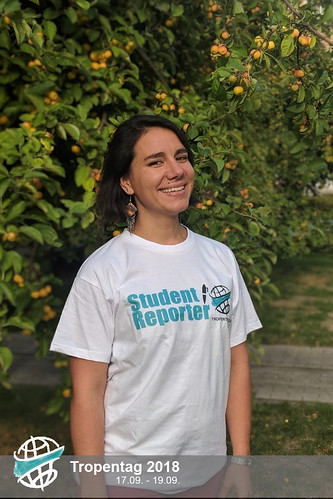Student Reporters 2018

Answering the Big Questions on Global Agriculture and Nutrition.
Wed, 09/19/2018 - 15:22 — kehinde odeniyiAnswering big questions is natural to Tropentag, as the 20th edition of her prestigious interdisciplinary conference on tropical and subtropical agriculture kicked off today. Intuitive biodiversity, mythical organic agriculture and the nexus between agriculture, nutrition and health were some of the questions answered by the keynote addresses in this year’s Tropentag.
Redefining Smallholder Agriculture
Science networking: a necessary challenge.
Tue, 09/18/2018 - 19:24 — degodoyIt is not simple, as demonstrated in the third oral presentation session today. But the co-production and sharing of knowledge is an important approach to create awareness, improve social-economic conditions and find appropriate technologies in different places. The challenges and barriers are numerous, as Ms. Kristina Roesel from the International Livestock Research Institute in Kenya and Dr. Tom Bischof from the Zurich University of Applied Sciences emphasized on their presentations: long distances, difficulty of communication, poorness of infra-structures and cultural differences. All of these make the co-working of partnership of universities a complex task. But the benefits are undeniable, and successful cases like the e-learning platform offered by the Zurich University of Applied Sciences to the University of Lubjlana in Slovenia and the University of Agricultural Sciences in India, the RELOAD project from The University of Nairobi in partnership with University of Kassel (presented by Ms. Catherine Kunyianga) and the Mytox South, created at the University of Ghent between multiple universities in sub-Saharan Africa to reduce the risk of mycotoxins contamination in food (explained by Dr. Arnau Vidal from the University of Ghent). These programs show how it is possible to offer effective solutions to complex interdisciplinary problems. Ms. Camilla Adelle, from the University of Pretoria further unraveled the issues involved on trans-disciplinary research and production of knowledge, and the role of scientists on this mutual relation.
Nourishment by Insects!?
Tue, 09/18/2018 - 14:48 — degodoyYes, this idea is slowly being more accepted by western societies and becoming accessible to the increasingly growing population worldwide, as we could see in some of the presentations today! Traditionally used in Asian, Latin American and African cuisines, this practice has the potential to play an important role for nutrition security, helping to attend food demand and combat hunger. Due to the limited amount of agricultural land and natural resources, there is an urgent need to find other alternatives for protein sources than conventional meat products. In some places (e.g. Kenya and Uganda), it already constitutes 5–10% of protein intake of the rural and urban populace. Also, livestock production is a leading cause of anthropogenic-induced climate change; therefore more sustainable diets are needed.

It's Already Been Worth It
Mon, 09/17/2018 - 21:29 — zachmannIf you're thinking about being a Student Reporter for Tropentag in the future, I really recommend it. Of course it's the 1st day and we're riding on a high of exhaustion, buzz from the energy at the conference and, yes, a buzz from the wine offered at the social gathering. But if the past 3 days are anything to go by, I'd say send off your application ASAP and pack your bags for Tropentag 2019 Kassel-Witzighausen.
I don't want to speak to you about the conference, who won what award, or who presented what poster. I want to speak to you about the backstage action in room 057 in Block A.

Tropentag 2018 Participant Infographic
Mon, 09/17/2018 - 20:12 — arrahiemTropentag 2018 is the largest conference related to Tropical and Subtropical Agriculture. This year, Tropentag is held in Ghent, Belgium. There are almost 900 people registered coming from 70 countries all over the world. More than half of these participant are students; Bachelors, Masters, and PhD’s. 450 contributions to tropical and subtropical research consist of 111 oral presentations, 339 poster presentations, and 9 keynotes.
A fit of giggles
Mon, 09/17/2018 - 11:34 — huidobroGabriela is doing her MSc in Tropical Forestry in the University of Dresden, Germany. Apart from being a coffee lover and a curious traveler, one of her passions is the Eastern Plains of Colombia where she did conservation work with palm communities. Currently, she is planning to develop her thesis research about fire management in the Colombian savannas. She believes that being a Tropentag student reporter is an opportunity to communicate through simple and attractive channels on what’s happening in the scientific community. This year, Gabriela is going to be part of the blogging and photography team, which she hopes to use to dig deeper into the agroforestry field and uncover interesting discussions about land and biodiversity conservation.
Intro Video to Tropentag 2018 Student Reporters
Mon, 09/17/2018 - 09:57 — degodoyThe Tropentag 2018 Student Reporters team have an introductionary video to present themselves!

Student Reporters 2018 Infographic
Mon, 09/17/2018 - 09:12 — arrahiemA big welcome from our multicultural student reporters from all around the world! The twelve Student Reporters are young and bright Master and PhD students from 9 different universities from all across Europe, and come from 10 different countries: Ghana, Nigeria, Indonesia, Moldova, Germany, USA, Canada, Peru, Colombia, and Brazil. They will provide insight about what happened throughout the conference, reporting speeches, presentations, and the key highlights from the world’s largest conference related to Tropical and Subtropical Agriculture.








